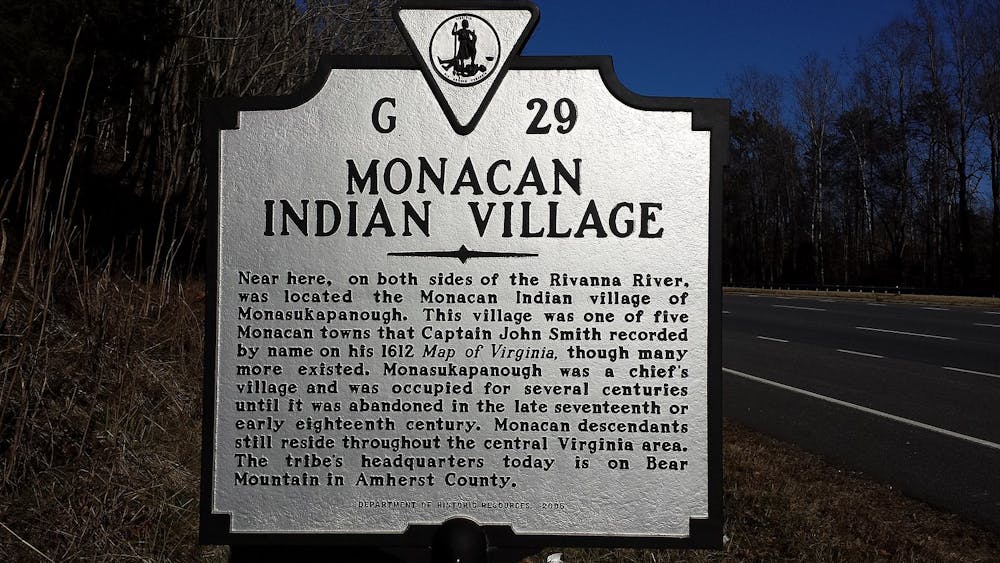If you are a current or even past student at the University, you may have seen a land acknowledgement statement that appears at the end of your class syllabus. Perhaps the professor has even read the statement out loud. Maybe the professor even went as far as having you pull up a Native American land map so you could see what Native land your hometown sits on. If you did not already know, the University occupies Monacan land. However, most students’ understanding of the Monacan land and people does not go beyond that. Some may believe the inclusion of a land acknowledgement statement is sufficient, or that all professors should include one in their syllabi. I argue however, that this is not enough. Instead, the University benefits when land acknowledgement does not go any further than just recognizing that you occupy Monacan land. Rarely do you learn about the history of how the land which the University sits upon was forcibly taken, or about the people from whom the land was stolen. The University must move beyond the performative aspects of land acknowledgement and start taking further action towards making amends with the Monacan Nation.
The history of land acknowledgment spans cultures and has historically allowed Native people to fight back against lack of representation and cultural erasure. As Native American people are not a monolith, each Tribal Nation has its own definition of land acknowledgement. Similar to the definition of land acknowledgment, the purposes and ways to acknowledge the land may also differ by Tribal Nation. According to the Monacan Nation website, the purpose of land acknowledgement is to “create awareness of Indigenous presence and land rights in everyday life.” Land acknowledgement can appear in a variety of formats from lectures, to ceremonial openings to email signatures. Land acknowledgement is not the end goal for every nation however. Ideally, land acknowledgment would lead to land back.
While the University has attempted to acknowledge its history of forcibly using enslaved laborers to build on stolen Monacan land, there has been little effort on the University’s part to atone for its role in cultural erasure. The University claims it wants “to engage in meaningful relationship building for our shared futures and acknowledge with respect that we live, learn and work on the traditional territory of the Monacan Indian Nation.” It seems that at every attempt to make amends, however, the University fails. Few resources are offered for Native students, there has been no attempt at land back, and as far as the University’s Diversity Dashboard reports, there are still no tenured Native American professors. Additionally, the University has been slow in hiring a tribal liaison, and it has been slow to build a Native American Student Center despite years of student-led advocacy.
Even the University’s past attempts to reach out to Native American communities has been minimal. In 2012, the University tried to increase Native American student attendance through a series of educational videos on college life. However, it failed to consider that a more effective solution would be offering free tuition for Native students — an initiative that is already underway at several universities. Perhaps most egregiously has been the University’s acquisition of Morven Farm, which was the property of the Monacan people in the 17th and 18th centuries before it was forcibly taken by white settlers. It came to be the property of the University in 2001 through its most recent owner John Kluge, who donated the property. The University has only recently designated Morven Farm into a sustainability lab. It is very ironic that the University believes it can do a better job at taking care of the land and fighting climate change than the actual community it belongs to. This property should never have been acquired by either of its previous white owners, or by the University in the first place. It is stolen land.
We have the tendency to see colonialism as a thing of the past, but it continues to happen and the University is complicit in it. The University has been hypocritical in its use of land acknowledgment. It claims to care about the land and the people, but it continues to do the bare minimum and is slow to action while Native activists continue to fight for change. What can be done? Well the University can begin by following the lead of other institutions and offering free tuition for Native students. It can require students to take a Native American history class so that they can expand their knowledge on Native culture beyond the obligatory land acknowledgment statement. The University must hire more Native professors so that the burden of teaching these cultures does not rest on the shoulders of a few Native professors who are then expected to be the sole voice for thousands of different Tribal Nations. It must also return Morven Farm to its rightful owner, the Monacan people. The University cannot rewrite the past, but it can do everything in its power to make the future better for Native American students and the Monacan community.
Yssis Cano-Santiago is an Opinion Columnist who writes on Health, Technology and the Environment for The Cavalier Daily. She can be reached at opinion@cavalierdaily.com.
The opinions expressed in this column are not necessarily those of The Cavalier Daily. Columns represent the views of the authors alone.







